The Hunger Games Film: For Your Consideration
 So last week my husband and I got around to finally seeing The Hunger Games like the rest of the country. We hadn’t seen a children’s book adaptation since Hugo, a movie we were both fairly meh about. Hunger Games was a far cry from the realm of Selznick, though. Where Hugo appeared to be written with a nostalgic adult audience in mind, Hunger Games was a crowd pleaser for more than one kind of crowd. That said, Matt and I disagreed on the final tally. I felt that it certainly had its flaws but was a strong adaptation in an era of Twilight. He, in contrast, wrote the recent blog post Rulebook Casefile: Obstacle Vs. Conflict in The Hunger Games. After reading it (and the very intelligent and fascinating comments that follow) I was able to start crafting my own response to the film. Consider the following a kind of mental tally put in electric ink.
So last week my husband and I got around to finally seeing The Hunger Games like the rest of the country. We hadn’t seen a children’s book adaptation since Hugo, a movie we were both fairly meh about. Hunger Games was a far cry from the realm of Selznick, though. Where Hugo appeared to be written with a nostalgic adult audience in mind, Hunger Games was a crowd pleaser for more than one kind of crowd. That said, Matt and I disagreed on the final tally. I felt that it certainly had its flaws but was a strong adaptation in an era of Twilight. He, in contrast, wrote the recent blog post Rulebook Casefile: Obstacle Vs. Conflict in The Hunger Games. After reading it (and the very intelligent and fascinating comments that follow) I was able to start crafting my own response to the film. Consider the following a kind of mental tally put in electric ink.
For me, the movie mostly works not just because of what it does do but in large part because of what it doesn’t do. I decided to make a list and put it here, though I’d be interested in your own opinions. And for the record Matt’s subsequent post on Deathwish Fulfillment is also worthy reading.
ADVERTISEMENT
ADVERTISEMENT
What the Hunger Games Movie Does NOT Contain (the good):
– A drawn out romance between Katniss, Peeta, and Gale. It’s interesting that with the Twilight movies doing so well the filmmakers weren’t inclined to play more with the three-way romance here. I was grateful for it, of course, since this film is not the time or the place to get into all of that. Besides, every time they cut to Gale in the movie the audience giggled at his earnestness. Bodes badly for the future, it does.
– Product placement. You laugh but don’t you remember that Star Trek prequel from a couple years ago? That film had the gall to include at least two (probably more) ridiculous shots of futuristic product placement. I lived in fear that we’d see some Bladerunner-type shot of The Capitol with ads all around and about and while I would have appreciated less CGI the lack of advertising was sublime.
What the Hunger Games Movie Does NOT Contain (the bad):
 – A satisfactory death scene for Rue. Matt’s not a fan of when folks take a novel in its entirety and slap it onto a screen without taking into account the different format (print vs. film). He’s far more inclined than I am to change large chunks of a story’s plot if it makes for a better movie in the end. I’m reluctant to change too much in a given film, having enjoyed movies like the Harry Potter films (well, some of them) precisely because they brought to life the heart of what I loved about the books. That said, there are certain elements in The Hunger Games that worked for me precisely because I saw them in my brain as I was reading about them in a cinematic way. And then there were the parts that should have worked on the big screen and, for whatever reason, didn’t. Rue’s death was a perfect example of this. Two years ago when I watched a fan video of Rue’s death I was pleased with how the filmmakers incorporated the lullaby and the flowers. I wondered at the time if the official film could even come close to the emotion of the scene, due in large part to how limited they’d be in terms of time. As I thought, the official film didn’t have the same amount of time to spare but they changed other more peculiar things. Though they set it up to mirror the scene early in the film where Katniss sings to Prim after she has a bad dream, in the film Katniss wasn’t allowed to sing two notes before the terrible orchestration (more on that later) swooped in and drowned out her voice. Meanwhile we started getting Rue Cam. Which is to say, we were seeing the sky from Rue’s perspective as it got fuzzy. I did not need Rue Cam. I wanted to hear a sad lullaby and to cry a little. Instead, no tears, a dead girl, and they didn’t even replicate that fantastic moment in the book where the mockingjays sing the lullaby back after Katniss finishes singing!
– A satisfactory death scene for Rue. Matt’s not a fan of when folks take a novel in its entirety and slap it onto a screen without taking into account the different format (print vs. film). He’s far more inclined than I am to change large chunks of a story’s plot if it makes for a better movie in the end. I’m reluctant to change too much in a given film, having enjoyed movies like the Harry Potter films (well, some of them) precisely because they brought to life the heart of what I loved about the books. That said, there are certain elements in The Hunger Games that worked for me precisely because I saw them in my brain as I was reading about them in a cinematic way. And then there were the parts that should have worked on the big screen and, for whatever reason, didn’t. Rue’s death was a perfect example of this. Two years ago when I watched a fan video of Rue’s death I was pleased with how the filmmakers incorporated the lullaby and the flowers. I wondered at the time if the official film could even come close to the emotion of the scene, due in large part to how limited they’d be in terms of time. As I thought, the official film didn’t have the same amount of time to spare but they changed other more peculiar things. Though they set it up to mirror the scene early in the film where Katniss sings to Prim after she has a bad dream, in the film Katniss wasn’t allowed to sing two notes before the terrible orchestration (more on that later) swooped in and drowned out her voice. Meanwhile we started getting Rue Cam. Which is to say, we were seeing the sky from Rue’s perspective as it got fuzzy. I did not need Rue Cam. I wanted to hear a sad lullaby and to cry a little. Instead, no tears, a dead girl, and they didn’t even replicate that fantastic moment in the book where the mockingjays sing the lullaby back after Katniss finishes singing!
Here’s the fan video that did a pretty good job:
– A significant score. Remember when the first Harry Potter film came out and you heard the John Williams score for the first time? If you were anything like me you gave a definite sigh of relief. I had high hopes for something similar with this film when I saw an early preview. The four note song of Katniss played at the end of that preview (you can hear it here) made me think that hopefully the musical theme of the three movie series (pray it’s not four) would be based on those nice eerie notes. Alas, it was not to be. In fact, the score of The Hunger Games is no great shakes. Constantly interrupting meaningful scenes, distracting when it should lie low, and drawing too much attention to itself at the worst moments this was a good example of a movie succeeding in spite of its problems.
What Hunger Games Does Contain (the good):
ADVERTISEMENT
ADVERTISEMENT
 – Haymitch. In one scene Haymitch speaks to the kids for the first time, drunk out of his mind. Peeta tries to take his drink and Haymitch stops him with a bizarre bare foot to the chest. Where the heck are his shoes? Really, Haymitch was used perfectly in the film in general. Getting to see him working behind the scenes was essential. You almost wish you’d seen that in the film.
– Haymitch. In one scene Haymitch speaks to the kids for the first time, drunk out of his mind. Peeta tries to take his drink and Haymitch stops him with a bizarre bare foot to the chest. Where the heck are his shoes? Really, Haymitch was used perfectly in the film in general. Getting to see him working behind the scenes was essential. You almost wish you’d seen that in the film.
– Great performances. With the exception of Sutherland everyone seemed to be putting their all into this film and it showed. Stanley Tucci being the best, of course.
– Good shortcuts. How does Katniss get the Mockingjay pin? Well we cut out the mayor’s daughter (no tears there) and it has to be quick and dirty. There were lots of moments like that. Smart elements and people cut down to accommodate for time.
What Hunger Games Does Contain (the bad):
– Bad guy cops (Peacekeepers) clad in white ala a dystopian movie circa 1975. Nuff said.
– A Donald Sutherland to be a de facto villain. I understand wanting to show a bit of the bad guy in the first film, but to my mind the whole reason we don’t see much President Snow in the first book is to show how the villain in this story isn’t one guy but society itself. By constantly cutting to Sutherland (a sleepy performance if ever there was one) we get the feeling that if you just took that guy down everything might be okey-dokey.
– A low-key Cinna. However, this was my fault entirely. With all the talk about whether or not GLBTQ characters are sufficiently represented in YA dystopian fiction I was hoping to see a heroic gay character on the screen in the form of Cinna. Lenny Kravitz gave a “subdued” performance and there’s nothing to say that his Cinna isn’t gay. I wanted someone out there and heroic and I didn’t get that, but that was my own personal reading of the part. After all, there’s nothing saying that Cinna is gay in the books.
Filed under: Uncategorized
About Betsy Bird
Betsy Bird is currently the Collection Development Manager of the Evanston Public Library system and a former Materials Specialist for New York Public Library. She has served on Newbery, written for Horn Book, and has done other lovely little things that she'd love to tell you about but that she's sure you'd find more interesting to hear of in person. Her opinions are her own and do not reflect those of EPL, SLJ, or any of the other acronyms you might be able to name. Follow her on Twitter: @fuseeight.
ADVERTISEMENT
ADVERTISEMENT
SLJ Blog Network
One Star Review, Guess Who? (#202)
Exclusive: Giant Magical Otters Invade New Hex Vet Graphic Novel | News
Parsing Religion in Public Schools
Take Five: LGBTQIA+ Middle Grade Novels
ADVERTISEMENT



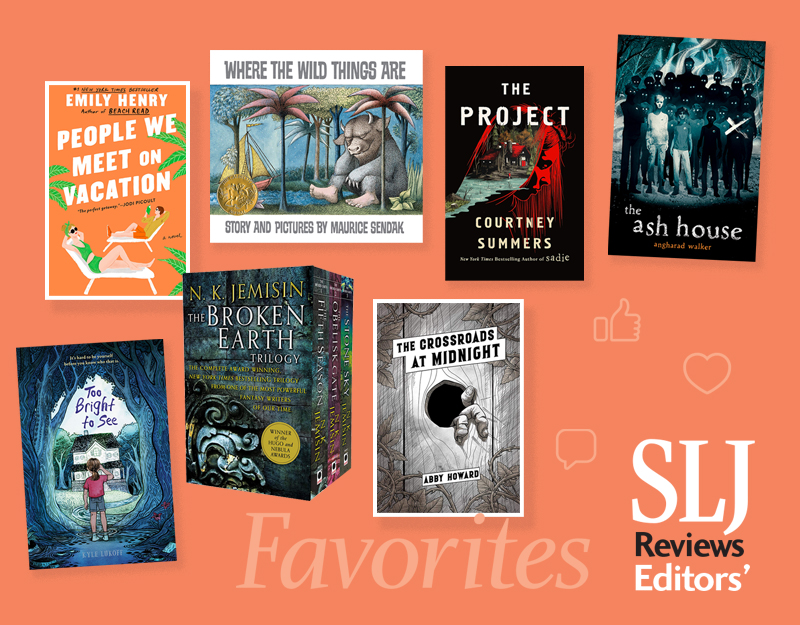
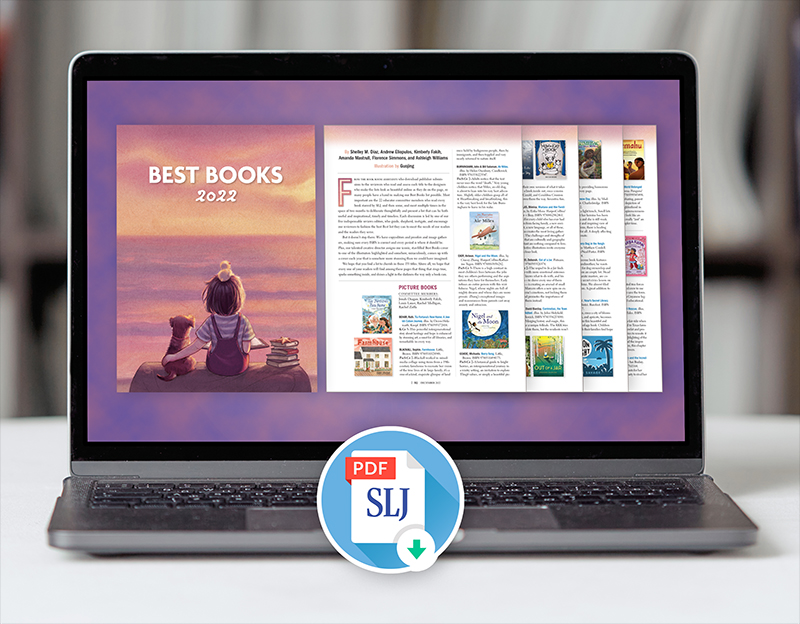
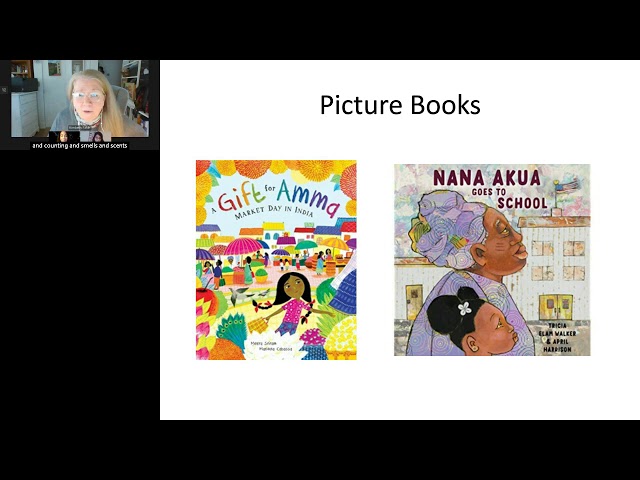
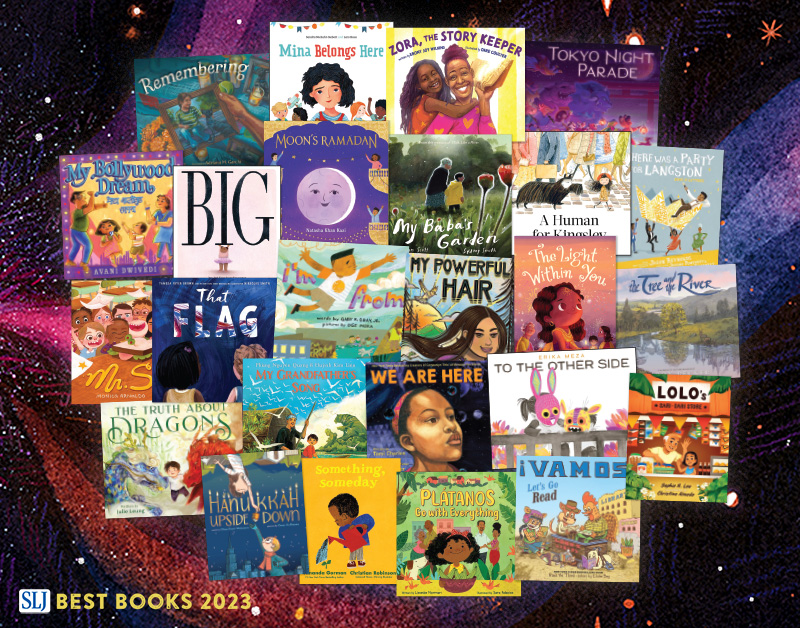
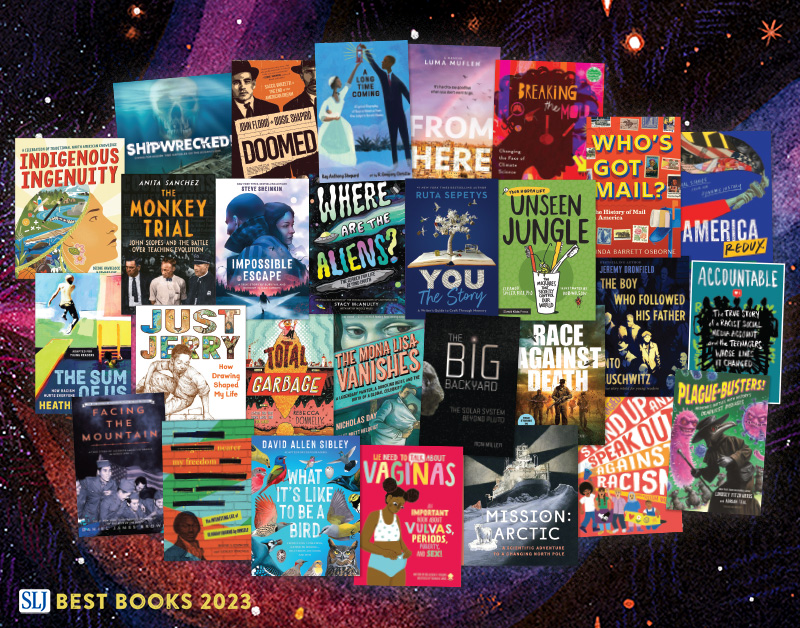
I was hoping for a more “fabulous” Cinna, if that’s what you mean — the flamboyance we often associate with gay men in our society and Hollywood in particular. Whether or not the character is gay isn’t relevant to the story, but I was disappointed that a character whose career is making amazing, creative costumes for bizarro gladiator events didn’t present himself with some of that same exuberance. He seemed more like a therapist in gold eye shadow. I thought Lenny Kravitz did a fine job, and I liked his Cinna. It just seemed like a different Cinna from in the book.
I ended up seeing the movie for a second time with some students last week so had time to think a lot about it. I actually thought Sutherland was creepy-good, but was also puzzled by the amount of attention they gave him. Figured it was a set-up for the next movie. (Must admit though that Sutherland sounded an awful like Robert California of “The Office.”)
I have not revisited the book since first reading it, but my recollection is that there is the sense that Peeta does love her, but Katniss does everything for the game. Whereas in the movie that kiss in the cave comes across as genuine affection. As a result her shrewdness at figuring out to have them both win comes across differently. Part of the problem may be that we are not in Katniss’s head in the movie as in the book.
I had the same feeling about Cinna. I thought Rue’s death was affecting, but agree that switching POV was a bit lame.
I think the filmmakers made a sideswipe at making Katniss calculating when she received the note from Haymitch saying “You call that a kiss?” and then kissed Peeta immediately afterwards. But I’d agree they sort of wanted it both ways.
In retrospect I should have called it the “Rue Death Cam”.
Agree on Rue Death Cam. Agree on loving Haymitch foot attack — I was one of the people who’d hoped for John C Reilly’s casting, but was delighted by what Woody Harrelson did with the role: He seemed very much like a fast, wily, brilliant athlete gone to seed and to the self-loathing place. (In the book, I didn’t really stop to think much about what Haymitch would have been like as a tribute. The movie made you think about it.)
I really missed District 11 sending Katniss the bread meant for Rue, which showed just how much Katniss’s humanity toward Rue meant to her community. I was a little unnerved by replacing that scene with the scene of District 11 revolting. We find out in the next book that this is indeed what happened (and I do get that visually speaking, a bread drop is not as thrilling as scenes of horrific violence and firehoses being turned on people), but I felt it drew us out of the weird intimacy and intensity of the arena. And a stereotypical white liberal I worried that given the racism already surrounding the casting of the movie, that showing the black district as the only one where violence occurred during the games would play into more audience idiocy. I think I was wrong about that, though, whew.
I was amused by Matt’s comments — it sounds as though he wanted different source material. And I don’t think Katniss is passive (at least, not until Mockingjay, and that’s because she’s actually in the position of having to stop being active — physically, anyway — and start really thinking about what all her sound and fury adds up to and who she wants to be for the long haul rather than in the moment). I do think she’s the classic first-person-narrator reader-stand-in who is out of her element and rises to the occasion the way we all hope we would in her place. And I thought Collins (and the film) finessed the girl power/feminism issues really well. She’s no Bella, but she’s not so confidently kickass that she’s off-putting to (sadly) girls AND boys. In short, I thought this was a really, really smart adaptation. Of course the book’s better. As usual. (And I agree with you and Matt both on Hugo: MEH MEH MEH. Adaptation is hard! :))
as i saw it, the problems of rue’s death comes from a problem of pacing. the entire movies was condensed into a 2 hour package when what i’ve been arguing for is a “LOTR” treatment. there is no was to give rue the death from the book without the rest of the film having those reflexive moments. these are inherent problems in translating first-person POV books into limited omniscient POV (which is how we can see things katniss cannot, like rue cam, the TV commentators, snow’s private conversations with seneca, etc). the movie kept the plot but made no attempt to capture the emotion,
and that’s MY take.
Great review. All my problems with the movie I decided are problems with the format, not the actual production. Everything I didn’t like pretty much had to do with character development, or, more accurately, lack thereof, which I blame on the fact it’s an entire book smooshed into a 2-hour-ish time limit. If I hadn’t read the book and known that these characters actually have arcs, I would’ve enjoyed the movie much more. The only point I disagree with you on is Rue’s death scene. I thought it was sufficiently emotional, if only because I went to see the movie with my (very manly) husband, and when Rue died I was thinking “well they did a pretty good job of establishing an emotional connection between Katniss and Rue in this limited amount of time…” and then I glanced over at my (very manly) husband, and he had tears streaming down his face. Then I thought “Nevermind! They did a really good job of establishing an emotional connection between Katniss and Rue!” But I did miss the bread…
Did you know Danny Elfman was supposed to do the music but had to quit because of scheduling conflicts? That would have set a completely different tone.
And why did they put so much emphasis on “needing a sponsor” when in fact not a single sponsor helped during the games? Only Haymitch offered any help.
Any my only other issue with the film was the random placement of her memory of her father’s death. I know they had to include it for back story but it just seemed randomly throw in there.
However, this movie has made me want to read the books, so that’s gotta say something about the film, right? I wonder how a new director will take the second book..
It was unclear in the film but anytime Katniss got a little silver parachute gift (salve, etc.) that was because of the sponsors. Haymitch would arrange the shipments and could include notes but that was about it. One of the moments cut out of the film was when Rue’s district sends Katniss bread, even though it’s expensive to do so. Read the books, Kate! They’re worth it.